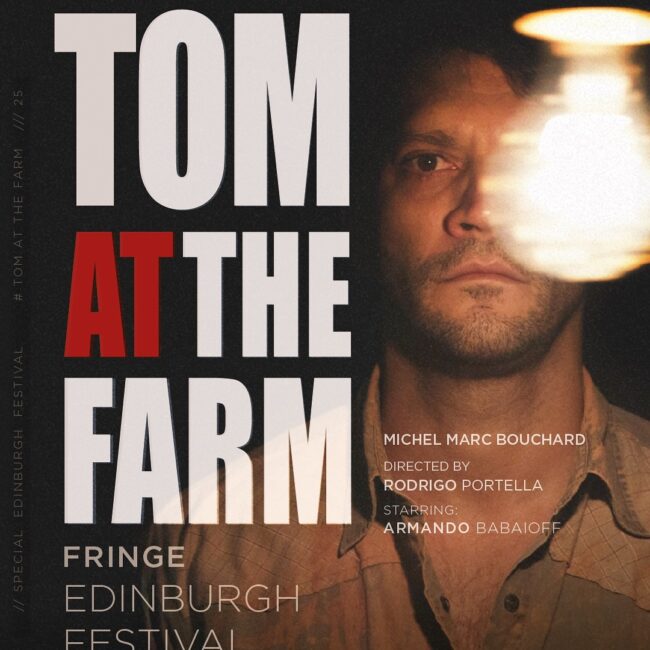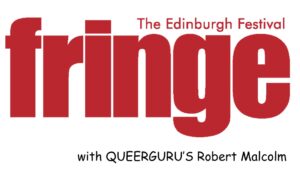
|
Tom at the Farm ***** Edinburgh Festival Fringe |
This powerful tour de force of physical theatre unfolds like a homophobic horror story. You can’t fail to be moved by its emotional intensity and raw beauty.
Written by Michel Marc Bouchard and first presented in Montreal in 2011, this version in Portuguese is skilfully directed by Rodrigo Portella and performed in Edinburgh by an exceptional cast from Cena Brazil International.
The choice to move the action from Canada to Brazil was both artistic and political. This farm is poor and primitive. Its future is bleak. The economic and social differences between the city and country in Brazil are enormous, and in addition, it has reported the highest rate of violent LGBTQ+ deaths in the world.
 The staging is rough and sparse. Before the story begins a mud splattered tarpaulin is unfolded across the floor and numerous zinc buckets are placed around the perimeter waiting to be emptied or filled with various fluids during the play. The lighting is simple but effective, ranging from a single lightbulb in the centre of the stage, to a blazing array of spotlights facing the audience. Sound plays a big part in this performance too, whether it’s the menacing howls of coyotes in the distance or the joyful rhythms of Latin music in the background.
The staging is rough and sparse. Before the story begins a mud splattered tarpaulin is unfolded across the floor and numerous zinc buckets are placed around the perimeter waiting to be emptied or filled with various fluids during the play. The lighting is simple but effective, ranging from a single lightbulb in the centre of the stage, to a blazing array of spotlights facing the audience. Sound plays a big part in this performance too, whether it’s the menacing howls of coyotes in the distance or the joyful rhythms of Latin music in the background.
 After the death of his boyfriend in a motorcycle accident, fashionista Tom (Armando Babaioff, who also wrote the Portuguese translation) drives to his funeral in an isolated rural village. To Tom’s surprise his boyfriend’s mother Ágatha (Denise del Vecchio) has never heard of him, has no idea her son was gay and believes he had a girlfriend in the city. However, her handsome but homophobic older son Francis (Iano Salomão) has known all along that his brother was homosexual and is obsessed with hiding this fact from his mother.
After the death of his boyfriend in a motorcycle accident, fashionista Tom (Armando Babaioff, who also wrote the Portuguese translation) drives to his funeral in an isolated rural village. To Tom’s surprise his boyfriend’s mother Ágatha (Denise del Vecchio) has never heard of him, has no idea her son was gay and believes he had a girlfriend in the city. However, her handsome but homophobic older son Francis (Iano Salomão) has known all along that his brother was homosexual and is obsessed with hiding this fact from his mother.
The pair, who own a failing dairy farm, have a dysfunctional, codependent relationship. Francis, at the age of forty, and with a history of extreme violence, has only had one relationship with a woman and is emotionally tied to his mother.
Tom’s arrival is a blessing to Ágatha who sees him, miraculously, as her younger son reborn and Francis enjoys having a new brother to bully and torture. They encourage him to stay and help on the farm.
Despite increasing brutality from Francis,Tom remains. This may be a form of Stockholm syndrome or it may be that because Francis physically resembles his dead boyfriend, Tom is living out a sadomasochistic fantasy with him, avoiding the reality of his grief.
Tom is resilient, and while enduring the worst of Francis’ abuse, forms a bond with him. Francis remains a loose canon and at any sign of tenderness from Tom, Francis subjects him to even further physical pain and degradation.
One of the many highlights of this production is a dance sequence between the men. While their previous physical interactions have been terrifying, this is different. Francis tells Tom they will dance a Cumbia and Tom will take the woman’s part. The passionate choreography which follows sees Francis repeatedly throwing Tom away and then pulling him close, always just stopping short of a kiss. The men are engaged in a game of power and seduction where each is playing to different rules.
Later, his visceral response to Francis’ messy delivery of a calf is a like a religious conversion for Tom. It completes his transformation from a decadent cissy to a “real man” validating his relationship with Francis. It’s as if they have had a child together. Meanwhile Francis is showing small signs of Tom’s “feminine” influence.
The arrival of Sara, (Camila Nhary) pretending to be the dead son’s girlfriend, and urging Tom to escape with her, is a light hearted interlude, but the mood suddenly darkens before the play’s shocking denouement.
The Fringe showcases many excellent performances but this awe-inspiring production is on another level.
|
Edinburgh Festival Fringe. Daily at 15.30, excluding 20th August, until 24th August |
| Queerguru Contributing Editor Robert Malcolm is a trained architect and interior designer who relocated from London to his home town of Edinburgh in 2019. Under the pen name of Bobby Burns he had his first novel, a gay erotic thriller called Bone Island published by Homofactus Press in 2011. |

